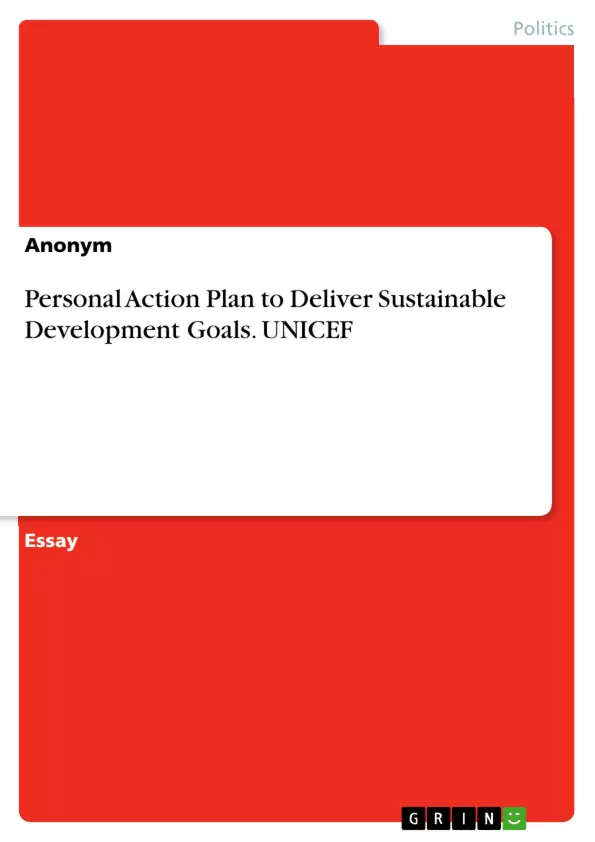Humanitarian organisations, such as UNICEF, strive to provide the best services to the people that they serve. They want to do so in an ethical, socially responsible, and sustainable manner. This paper explored how UNICEF can implement programmes that facilitate realisation of the SDGs. The paper found that for UNICEF to achieve this objective, it will have to uphold high ethical standards and clarify the responsibilities of different actors and stakeholders. The leadership must be accountable to both the organisation and the stakeholders. In relation to ethical leadership, UNICEF must make sustainability the focal point of their strategies and ensure that its activities are viable. Leaders must also be innovative and resourceful in building necessary partnerships to achieve UNICEF’s mission. Through effective ethical and responsible leadership, the organisation will be able to address challenges, such as efficiency in resource use, fairness and justice, and duplication of functions. In conclusion, the paper identified good leadership as the most important pillar in overcoming organisational challenges.
Table of Contents
- Executive Summary
- Introduction
- Week (1): Standing up for the Rights Of Others
- Governance and Leadership
- Week 1: SDG 16: Peace, Justice, and Strong Institutes
Objectives and Key Themes
This paper explores how UNICEF can implement programs to facilitate the realization of the Sustainable Development Goals (SDGs). The main objective is to identify strategies for UNICEF to achieve its mission ethically, sustainably, and responsibly. This involves clarifying responsibilities of stakeholders, promoting ethical leadership, and fostering resource efficiency and effective partnerships.
- Ethical and Responsible Leadership
- Sustainable Development Goals (SDGs)
- Stakeholder Engagement and Collaboration
- Resource Efficiency and Sustainability
- Program Implementation and Effectiveness
Chapter Summaries
Executive Summary: This executive summary highlights the paper's findings on how UNICEF can effectively implement programs aligned with the SDGs. It emphasizes the crucial role of ethical leadership, clear stakeholder responsibilities, and sustainable practices in achieving UNICEF's objectives. The need for accountable leadership focused on sustainability and innovation in partnerships is underscored as key to overcoming challenges such as resource efficiency, fairness, and functional duplication.
Introduction: This introductory section provides background information on UNICEF, its global operations, and its core responsibilities in child health, nutrition, education, and emergency relief. It establishes the context of the SDGs and their importance for UNICEF's work, emphasizing the inextricable link between achieving the SDGs and the realization of children's rights. The introduction sets the stage for the subsequent discussion on how UNICEF can contribute to the SDGs' achievement.
Week (1): Standing up for the Rights Of Others: This chapter focuses on the critical role of governance and leadership in achieving UNICEF's goals. It examines the importance of ethical leadership in promoting sustainability, resource efficiency, and stakeholder satisfaction. The chapter draws on various sources to illustrate how effective leadership fosters collaboration, addresses malpractices, and encourages innovation. Specific examples highlight the role of leadership in balancing stakeholder interests and adapting to changing circumstances to achieve SDG 16 (Peace, Justice, and Strong Institutions).
Keywords
UNICEF, Sustainable Development Goals (SDGs), Ethical Leadership, Stakeholder Engagement, Sustainability, Resource Efficiency, Program Implementation, Child Rights, Governance.
UNICEF Program Implementation and the SDGs: FAQ
What is the main purpose of this document?
This document provides a comprehensive preview of a paper exploring how UNICEF can effectively implement programs aligned with the Sustainable Development Goals (SDGs). It includes a table of contents, objectives and key themes, chapter summaries, and keywords.
What are the key objectives of the paper?
The main objective is to identify strategies for UNICEF to achieve its mission ethically, sustainably, and responsibly. This involves clarifying stakeholder responsibilities, promoting ethical leadership, and fostering resource efficiency and effective partnerships.
What are the key themes explored in the paper?
The key themes include ethical and responsible leadership, the Sustainable Development Goals (SDGs), stakeholder engagement and collaboration, resource efficiency and sustainability, and program implementation and effectiveness.
What does the Executive Summary cover?
The executive summary highlights the paper's findings on how UNICEF can effectively implement programs aligned with the SDGs. It emphasizes the crucial role of ethical leadership, clear stakeholder responsibilities, and sustainable practices in achieving UNICEF's objectives. It also underscores the need for accountable leadership focused on sustainability and innovation in partnerships.
What is covered in the Introduction?
The introduction provides background information on UNICEF, its global operations, and its core responsibilities. It establishes the context of the SDGs and their importance for UNICEF's work, emphasizing the link between achieving the SDGs and realizing children's rights.
What is the focus of "Week (1): Standing up for the Rights Of Others"?
This chapter focuses on the critical role of governance and leadership in achieving UNICEF's goals. It examines the importance of ethical leadership in promoting sustainability, resource efficiency, and stakeholder satisfaction, and how effective leadership fosters collaboration and addresses malpractices. It specifically highlights SDG 16 (Peace, Justice, and Strong Institutions).
What are the key words associated with this paper?
Key words include UNICEF, Sustainable Development Goals (SDGs), Ethical Leadership, Stakeholder Engagement, Sustainability, Resource Efficiency, Program Implementation, Child Rights, and Governance.
What specific SDGs are addressed?
While the paper addresses multiple SDGs implicitly through the discussion of ethical leadership, sustainability, and effective program implementation, SDG 16 (Peace, Justice, and Strong Institutions) is explicitly mentioned.
Who is the intended audience for this document?
The intended audience is likely academics and researchers interested in UNICEF's operations, the SDGs, and ethical leadership in international development.
Where can I find the full paper?
The full paper is not included in this preview. This is a summary intended for academic review and analysis of themes.
- Quote paper
- Anonym (Author), 2021, Personal Action Plan to Deliver Sustainable Development Goals. UNICEF, Munich, GRIN Verlag, https://www.grin.com/document/1303031



